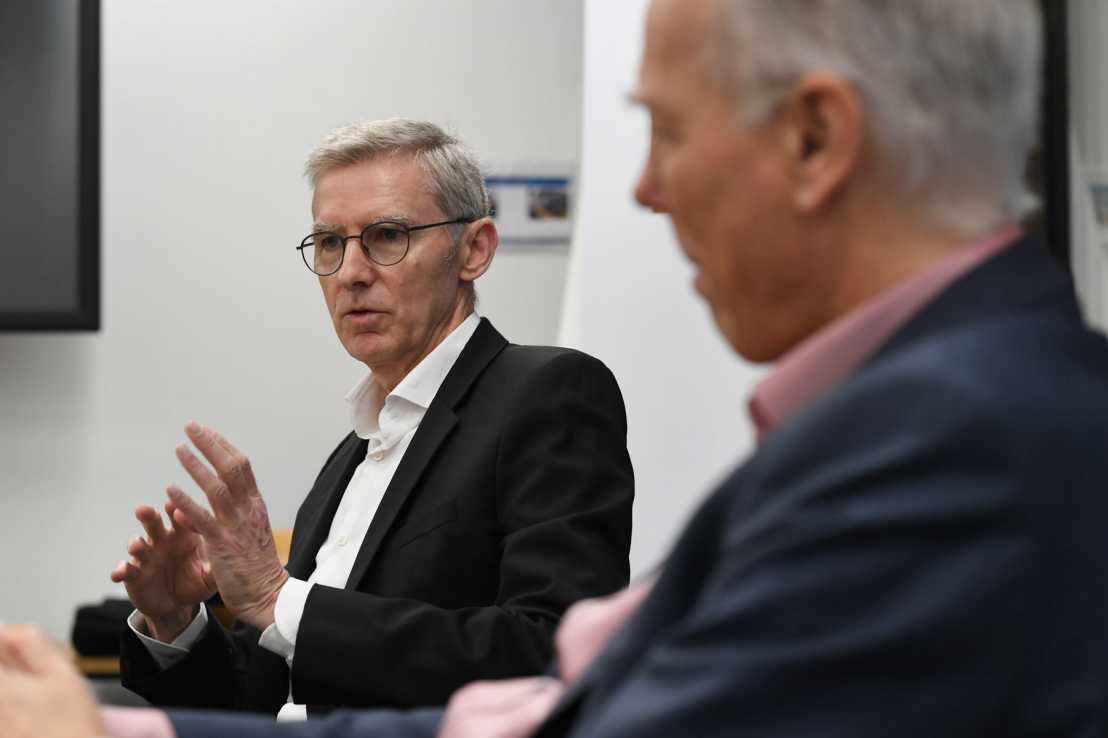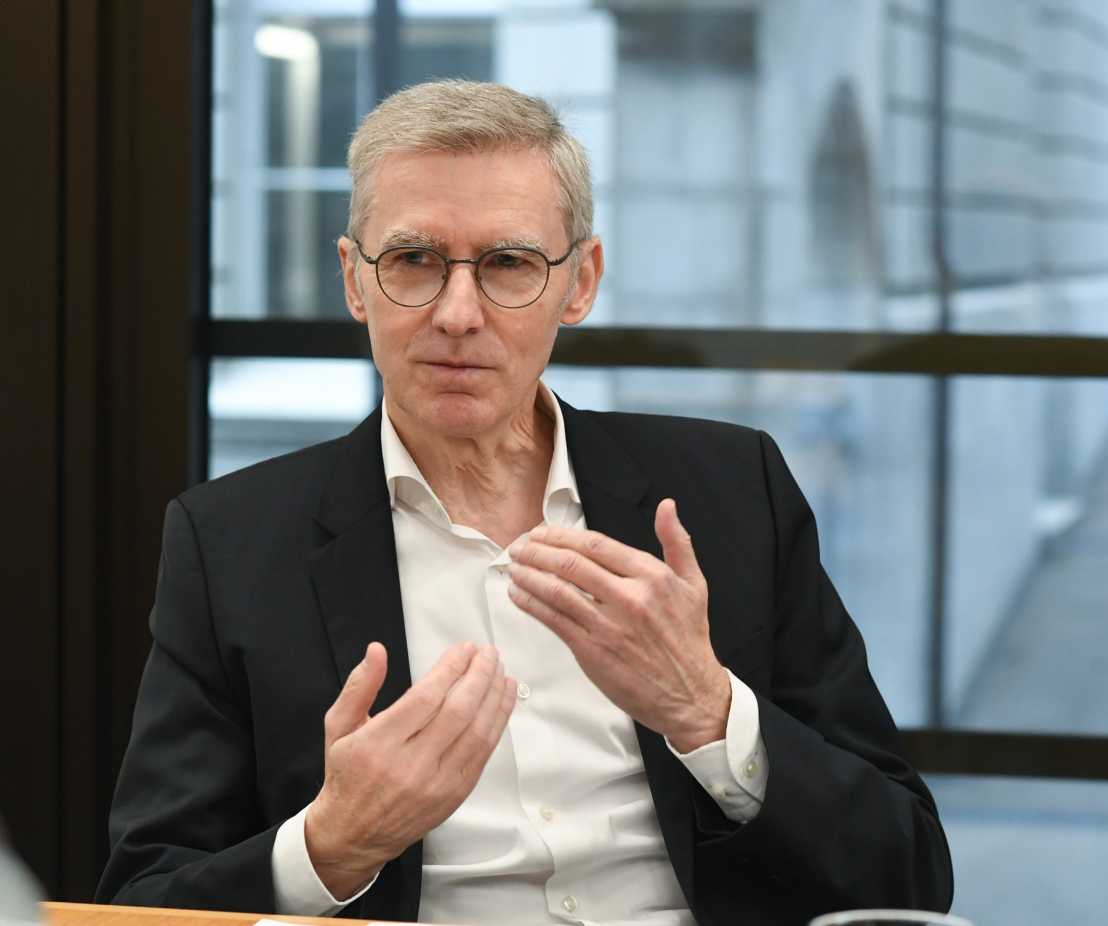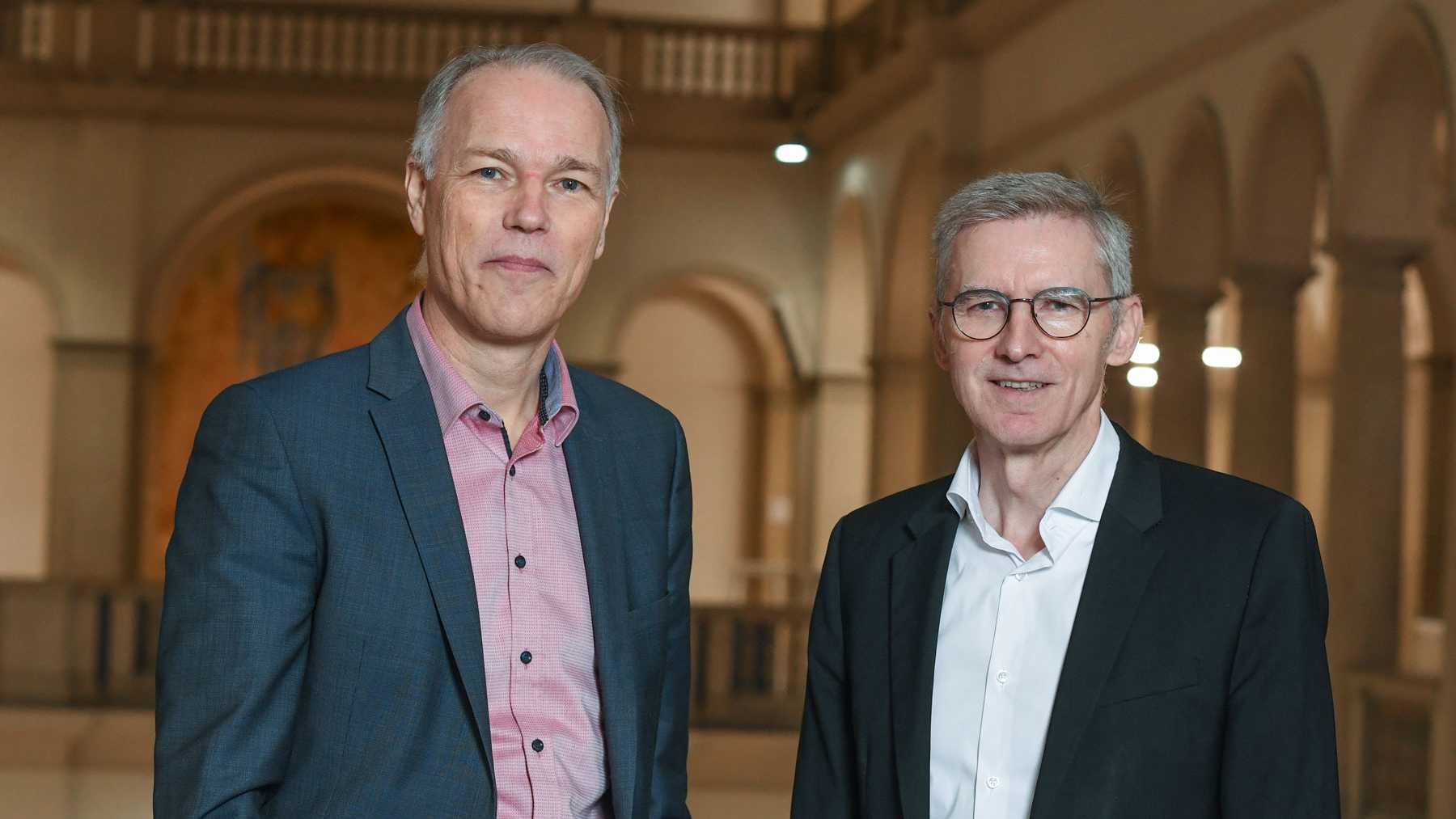“Our research is based on facts and data, not on value judgements”
Jan-Egbert Sturm and Hans Gersbach look back on 2023 and KOF’s 85th anniversary. They explain in this interview how the institute has been reconfigured and what contribution it plans to make to the Swiss economy in future.
Last year was marked by many geopolitical tensions such as the wars in Ukraine and the Middle East, while in Switzerland it was also characterised by the takeover of the big bank Credit Suisse (CS) and by issues such as labour shortages. How did all of this impact on the Swiss economy?
Jan-Egbert Sturm: At the beginning of the winter of 2022/23 there were serious fears that we might run out of gas and oil and that we could plunge into an energy crisis. That did not happen to the extent that we had expected – partly owing to the mild winter. 2023 therefore got off to a positive start compared with our forecasts. However, we had hoped for a slightly stronger recovery than the one that actually materialised. Then came UBS’s acquisition of Credit Suisse, and the headwinds from abroad increased over the course of the year. The second half of the year proved to be a real challenge for the export-driven manufacturing sector because of the weak international economy. And during the last winter half-year, at least, this industry found itself in recession.

Hans Gersbach: 2023 once again made us all very much aware of the geopolitical risks to international trade in goods and services – including those facing Switzerland. And this makes it necessary for Swiss politicians – as well as the private sector – to devise strategies that render the Swiss economy more resilient to such risks. The collapse of Credit Suisse triggered a negative reputational shock around the world and meant that the competitive situation in banking services – especially those for firms – deteriorated. And it again raised the old question of whether a systemically important bank that encounters extreme difficulties can be resolved or restructured without causing any major international disruption.
“Developments in 2023 made it necessary for politicians and firms to devise strategies that render the Swiss economy more resilient.”Professor Hans Gersbach
What role or function does KOF perform when such events occur? Has this changed over the past 85 years? How has the institute as a whole evolved over the course of its history?
Jan-Egbert Sturm: KOF’s job is to monitor and analyse the Swiss economy and, on this basis, to work out where it might be heading. This mission has not changed over the years. However, the role of data has become more important and we have become more research-driven. KOF is evolving in line with society.
Hans Gersbach: KOF provides both analysis and information for decision-makers on all economic policy issues. I think that two questions in particular have now moved centre stage. The first is whether we need to thoroughly rethink the issue of banking regulation and the problem of institutions that are ‘too big to fail’. I believe we have contributed some valuable input on this matter. And the second is the question of resilience. We recognised the urgent need for us to focus on this issue much more and to investigate just how resilient the Swiss economy is to geopolitical and other risks and how we can use appropriate analysis tools to measure and evaluate this.
“KOF’s job is to monitor and analyse the Swiss economy. This mission has not changed over the years.”Professor Jan-Egbert Sturm
There were also encouraging developments in 2023. Advances in artificial intelligence (AI) gave a significant boost to the field of technology, which in turn drove up share prices. Will this also have a noticeable positive impact on the real economy over the next few years? Do you see this as a one-off phenomenon or is it a structural change?
Hans Gersbach: We have seen that artificial intelligence is a technology that impacts on the whole economy rather than just on one sector. This means that it will have a positive effect on productivity going forward. Although the key questions are already being defined, at present they remain unresolved. Will AI improve or simply replace workers’ productivity? And, in addition to productivity growth, to what extent might inequality phenomena such as wage differentials be exacerbated? Our education and training system needs to be overhauled in order to meet these challenges. These are among the findings of KOF’s research. Given our existing education system, we are concerned that structural change might happen very rapidly in some areas.

Jan-Egbert Sturm: This is a process that has gained momentum very quickly this time. When I talk to experts from business, I am astonished at just how much has already been achieved here. We have to be careful not to always see AI purely as a substitute for work; it can also complement it. Academic studies clearly show that the digital revolution of the last 20 or 30 years has caused processes to be automated. These were processes that primarily affected the middle classes. Computers now perform many jobs previously done by highly-educated workers such as accountants. This has led to a certain amount of polarisation and even inequality, as Hans Gersbach has already mentioned. The new technology boom is much more general and will not necessarily have a major impact on income distribution because it will essentially permeate all sectors and might therefore be more equitable in its effect. Structural change always causes social friction. Maybe this time it will be different than in the past.
If we now look at 2023 in isolation, the introduction of rules of procedure and the new senior management structure consisting of two directors were among the most important changes for KOF. How do you now look back on last year, Hans Gersbach?
Hans Gersbach: I was very well received at KOF and was quickly able to start working effectively. We have found a good working arrangement in terms of how we coordinate, communicate and share tasks with each other. You can see that there are many projects and operations ongoing at KOF, and there is loads of expertise available there, which means that you can achieve quite a lot.
The KOF Lab has also been created in this context. What is its function?
Hans Gersbach: The KOF Lab is, in effect, intended to realise three ideas. First, we want to road-test new economic approaches and analysis to see whether they enable us to perform our nationally important tasks even better and more comprehensively. Second, young researchers will have the opportunity to raise their profile within their own section, to develop their careers and to contribute their own ideas. The Lab therefore acts like an incubator. And, third, if all goes well then it is designed to provide a springboard for for young researchers for a permanent position at KOF. The Lab is now fully operational with four sections, although this structure may change. It is a flexible incubator.
“There is loads of expertise available at KOF, which means that you can achieve quite a lot.”Professor Hans Gersbach
Today’s young generation is said to be highly political. Do you see that with young researchers in your field? Is that still consistent with your role as researchers, or should the two be kept separate?
Jan-Egbert Sturm: I think we should try, as far as possible, to separate the two. As researchers, we must not allow ourselves to be influenced by things that are subjective or on which opinions may simply differ. Our work must be driven by data and research. When KOF makes public statements, its academic neutrality is always guaranteed. Our research is based on facts and data, not on value judgements. That does not mean, however, that we are always neutral: researchers may – out of a certain desire to optimise a given situation – indicate what, in their ‘opinion’, is relevant or less relevant. In doing so, they must know what they wish to optimise and what their objective is. They can then say what the costs and consequences of plan A and plan B are. It is not the job of researchers to get involved in politics.
Hans Gersbach: Our ambition is to be an independent and honest academic intermediary for all decision-makers. And if value judgements are made occasionally, they must be clearly indicated as such. It goes without saying that individuals’ own interests play a role in selecting the topics that they would like to work on.
“Our academic neutrality is always guaranteed.”Prof. Jan-Egbert Sturm

Let’s look now at 2024: what are some of the concrete plans and topics for this year?
Hans Gersbach: At the beginning of this year we compiled a study on the challenges facing Switzerland’s system of innovation. We are also working on a study on the resilience of the Swiss economy to identify, for example, how we are affected by geopolitical risks and where we need to be concerned and where we do not. We are currently evaluating which model we will be using for our medium-term forecasts and scenarios. We plan to develop an initial version this year. We will then be making a contribution to the subject of banking regulation, where the finance ministry will be publishing a further report. We have also produced a strategic plan consisting of seven key thematic issues, which we will begin to implement in 2024.1
Jan-Egbert Sturm: We are constantly adjusting our economic models, and we have been working hard on new models in recent years. These are now being used. We are currently working on how we publish our forecasts. I expect to see some changes here. Our entire publication strategy will no longer be as it has been in the past. Much is already under way and will require a fair amount of time and money.
------------------------
1You can read more about these key strategic issues in the chapter entitled ‘Our institute’.
Contacts
Deputy head of KOF Swiss Economic Institute
Makroökonomie, Gersbach
Leonhardstrasse 21
8092
Zürich
Switzerland
Director of KOF Swiss Economic Institute
Professur f. Wirtschaftsforschung
Leonhardstrasse 21
8092
Zürich
Switzerland
